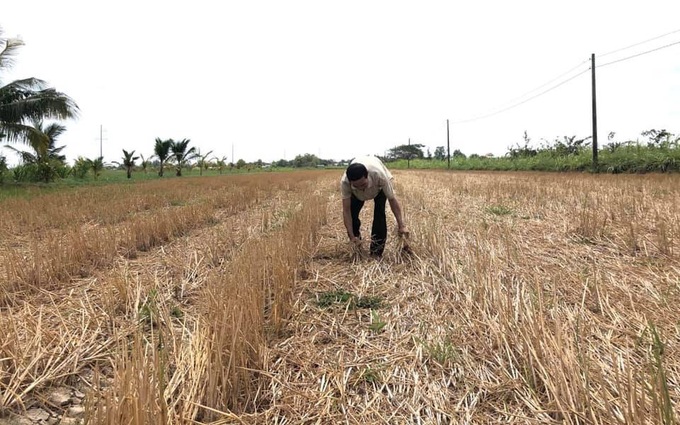
Rice dying from saline intrusion
He went on to say that he still tried to plant the second crop and invested VND60m in it. But the rice still died. He tried the third time on May 20, hoping that he will earn enough just to offset the loss. Nguyen Van Rubi, Xuong's neighbour, said he lost 17,000 square metres of crops twice in a month. Other families who work on the 2,600ha rice paddies in Thuong Thoi Tien and Thuong Phuoc 2 towns also face the same situation.
Ca Huu Tam, a seasoned farmer said hundreds of ha of rice had died. They are mostly grown near Giong Nen, Dia Rung and Suong Lung Tuong channels and the area near pumping station behind Thuong Thoi Tien's old headquarter.
Pham Hong Cuong, deputy head of the Hong Ngu District Department of Agriculture and Rural Development, confirmed that the rice has been dying in their area. According to Cuong, extreme weather is also the cause of the problem. After an initial investigation, it was concluded that because of the drought, the rice fields are left too dry and were contaminated with saline. The solution is to pump water in to clean the fields.
However, many farmers disagreed, saying that the fields were contaminated because fish farmers used industrial feed. Dozens of fish farms discharge wastewater into the channels which provide water to the rice fields.
The farmers also invited a group of agricultural engineers from Can Tho University to survey the fields. The farmers were surprised when they were told that the rice died from saline contamination because Hong Ngu is on the upstream of the Mekong River and 200km away from the west coast. The salinity level recorded on May 15 was 3-6ppt in the fields, 1ppt in the channels and 6ppt in the fish farms.
Nguyen Phuoc Tuyen, an independent agricultural researcher in Dong Thap said Thuong Thoi Tien was 3.5 metres higher than the sea level so it's impossible for a saline intrusion. He said he was not surprised that the salinity in the fish farms was 6ppt because the amount of salt in industrial feed accounts for 1-2%. However, Tuyen thinks that the rapid death of the rice fields was caused by both extreme weather and fish farm activities.
